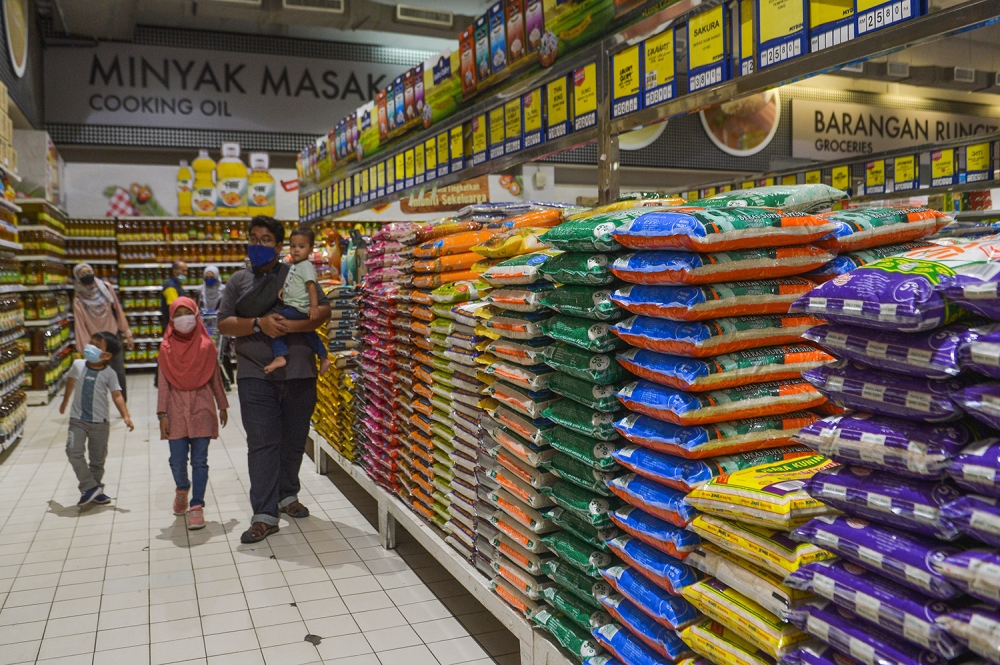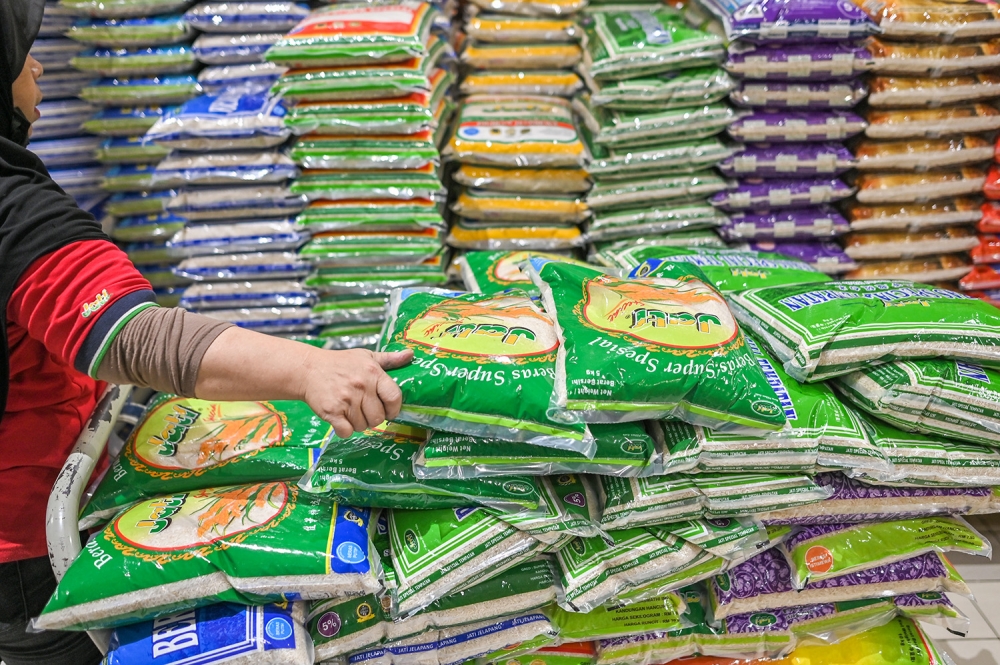KUALA LUMPUR, Feb 22 — Whether or not heirloom rice can be a revenue-generating crop is a question that needs further deliberation, experts said.
Anni Mitin, who is vice-president of the Malaysian Agroecology Society for Sustainable Resource Intensification (SRI-Mas) based here in Kuala Lumpur, said if plans are not properly mapped out, this could end up burdening rice farmers.
Commercialisation or cash crops
There is a difference between commercialisation and cash crops, she said.
“For cash crops like cocoa — that is a cash crop — you trade through a specific board like the pepper board, there is a cocoa board and you cannot trade it directly.
“With cash crops, it will also be floated on the futures market. So at one point the price will go high — because this is international trading — and we don’t want our rice to be traded as a cash crop, because this is our livelihood and this is our culture. This is beyond money,” Anni told Malay Mail.
She added that local rice farmers will not be able to compete with big players if the rice reaches the futures market.
“In a way, if we start to do this, we will have dumping of other rice in our market, so then how can our farmers compete?” she said.

Improving rice culture
Before talking about large scale cultivation, Anni said firstly, interested parties should look at how to improve and strengthen the heirloom rice supply and demand.
“As you can see on the demand side and consumer acceptance, it’s still not there for Malaysia.
“If the primary interest is to export, my concern is, you cannot even get your own people to eat this rice and yet you want to export.
“Of course the KRI (Khazanah Research Institute) recommendation is that first we must remove the subsidies — input subsidies for this heirloom rice — because if it’s for export then you don’t want to subsidise consumers overseas with our price. So this is the danger, a double-edged sword we have to be careful about,” she said.
So if there are recommendations to plant this heirloom rice on a large scale, the priority should be to make Malaysians appreciate what local rice farmers have and the market should be for Malaysians first.
Anni was responding to a report by KRI which suggested the rice industry in Malaysia can grow exponentially and become a major source of revenue if farmers in Sabah and Sarawak were to cultivate speciality rice grains on a large scale.
The think tank said there were around 500 unique rice varieties and that these seeds need to be preserved to prevent genetic loss of their unique characteristics; among them the Bario, Biris and Bajong.
Better left alone?
“Let me ask you this question, as a consumer you want to buy this rice, if we go through this formal market, you create this industry — premium market... this means as a consumer I expect it to be packaged nicely.
“It must be certified, which adds cost, and there’s a lot of middle men which make the price more expensive, or would you rather go directly to the farmer as most of the income cost will actually go to the farmer.
“So that’s why sometimes, you can imagine, the price of one kilogramme of Bario rice is RM20, but the Bario rice farmers get about RM7 or RM8. We don’t want that,” Anni said.
Instead she said the rice farmers should get most of the returns, not the plastic company who does the packaging, not the transportation companies and not licences.
“I think now to bring rice from Sabah and Sarawak, most of them need five licences/permits and these are expensive things.
“Even to mill rice you need a licence and these are unnecessary because in our community, in my kampung we have two to three millers that we pay the cost of running the operation and they mill when we want to eat,” she said.
She further explained that if, for example, Bario rice is made premium, most Bario rice can be kept for about six months.
However, if this stock is kept, it will lose its premium value.
“I don’t want to eat that, for me it’s not premium anymore if I have to eat last year’s stock,” she explained.
Amendment to regulations
While it is good to remove licences, the existing Control of Paddy and Rice Act 1994 will have to be changed.
“Now if we create another Act to control heirloom rice, I think it can backfire.
“It can backfire not only to the farmer but to the producers and marketers.
“And each time there is a new Act, we lose our freedom — the freedom to do something would be lost and it is also expensive for enforcement,” Anni said.
She added that at the moment while existing laws are rigid, one must understand why they are necessary.
“Rice is our staple food, it’s about food security and making sure that the rakyat have enough to eat.
“If we loosen this, it means that we only want to trade and not be concerned of whether our people eat or not.
“That can be dangerous. If we are only thinking of exporting, only a few people will gain,” she said.
Sabah native researcher Elizabeth Gimbad said she is in favour of loosening the laws when it comes to transporting rice across state borders because that is the biggest issue in Sabah.
“How do we bring our rice across from Sabah to Semenanjung without having to rely on friends... whether they balik kampung, or have to compete with baggage allowance... that’s basically the case that is happening now.
“This is a conversation that we have all the time in Sabah — why don’t we just buy the rice, and send it over by courier service — but that’s where we come across two issues.
“One, we don’t have that permit to bring it across the state border so if we get caught, that’s it.
“Secondly, the cost of delivery is insane, it’s about RM100 for 20 kilos, it makes it expensive,” Elizabeth said, adding that if this was made possible, at least the Sabahans and Sarawakians in Semenanjung can have a taste of home.
She also said that sending rice across borders is viewed as a very important part of food culture, as it is a way of sending food culture over from Sabah and Sarawak.

International competitiveness
The talk among Sabahan and Sarawakian farmers is similar about heirloom rice’s competitiveness in the international market.
“The farmers in Sarawak, at one point, were approached by a company in the UK, asking whether they could sign a joint-venture or an agreement so that they can import rice from this small village in Kota Belud.
“The company was willing to pay the premium, but the villagers, after coming together to talk about it, declined the offer as they did not have the capacity to provide the volume of rice required by the company, as it is subsistence for them first before making any profit,” she said.
The rice planting culture in Sabah and Sarawak prioritises personal consumption and only if they have extra they will consider selling.
Keeping the originality
Anni, in explaining further about heirloom rice, said there are a few elements that have to be met before it is accepted in the market as its original value.
“Heirloom rice, people don’t only look at whether it is a unique variety... they also look at how you cultivate — whether it is using traditional methods or whether you are using conventional farming with pesticides, they want to know.
“Bario rice, for example, was accepted by the Slow Food Foundation, an Italian-EU based foundation. It’s a very unique high value rice and it can fetch about €20 (RM94) per kg.
“Then when the policy to commercialise came about, they used tractors, they used pesticides and the Slow Food Foundation said no to the rice (as it has lost its organic values),” she said.
Protecting originality
When talking about sharing rice seeds, Anni said it is discouraged, but if seeds are to be shared, then there are protocols that need to be followed.
“How is it done? Under our law, we have PIC (prior informed consent) that under the biodiversity convention protocol and the Nagoya Protocol — if I plant your rice and I gain money from the commercialisation, how do I give back to the community? Who owns the rice?
“So if this is in place then it’s okay, but a lot of time, they plant and they make money and my community don’t even know,” she said.
Preserving traditional values
Nur Fitri Amir Muhammad, chief coordinator of the Malaysian Food Sovereignty Forum (FKMM), said the idea of large scale cultivation is not impossible but Sabah and Sarawak rice farmers need to be careful when implementing the commercialisation of traditional rice crops so traditional practices are not affected.
Nur Fitri who is also PeSAWAH (Pertubuhan Persaudaraan Peshawah Malaysia) secretary said there should be a scheme in place so that local people can enjoy the local rice produce.
“This means that the price of Sabah and Sarawak heirloom rice does not become too expensive due to the influence of the export market to Semenanjung and abroad.
“We can already see this in the price of durians, where the price of local durians is expensive because the durian export market is expensive,” he pointed out.
He added that large scale cultivation must also ensure that traditional practices based on natural agriculture agroecology is not replaced by conventional farming techniques that usually damage the values of the rice’s traditional nature.
He cited an example based on his previous groundwork discoveries where interviews with paddy farmers from Sungai Melikat, Sungai Peking and Sungai Stapang in Sarawak save and exchange seeds freely among themselves as it is an ancestral practice among the Iban communities that live here.
“The Iban communities are dedicated agriculturists with a correspondingly significant portion of traditions that relate directly to farming.
“For them, it is a norm for a farmer to grow crops, save seeds of every single variety that they plant in their paddy fields and exchange seeds with other farmers.
“However, the practice of selling seeds for cash is prohibited among Iban farmers because seeds are not meant to be sold but to be shared,” he said.




















